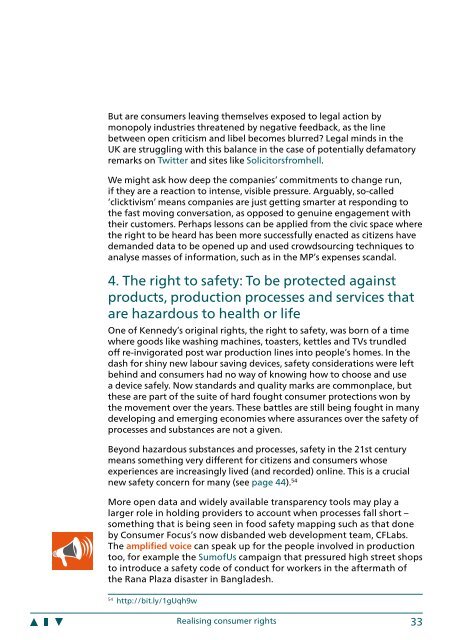Realising-consumer-rights
Realising-consumer-rights
Realising-consumer-rights
Create successful ePaper yourself
Turn your PDF publications into a flip-book with our unique Google optimized e-Paper software.
But are <strong>consumer</strong>s leaving themselves exposed to legal action by<br />
monopoly industries threatened by negative feedback, as the line<br />
between open criticism and libel becomes blurred Legal minds in the<br />
UK are struggling with this balance in the case of potentially defamatory<br />
remarks on Twitter and sites like Solicitorsfromhell.<br />
We might ask how deep the companies’ commitments to change run,<br />
if they are a reaction to intense, visible pressure. Arguably, so-called<br />
‘clicktivism’ means companies are just getting smarter at responding to<br />
the fast moving conversation, as opposed to genuine engagement with<br />
their customers. Perhaps lessons can be applied from the civic space where<br />
the right to be heard has been more successfully enacted as citizens have<br />
demanded data to be opened up and used crowdsourcing techniques to<br />
analyse masses of information, such as in the MP’s expenses scandal.<br />
4. The right to safety: To be protected against<br />
products, production processes and services that<br />
are hazardous to health or life<br />
One of Kennedy’s original <strong>rights</strong>, the right to safety, was born of a time<br />
where goods like washing machines, toasters, kettles and TVs trundled<br />
off re-invigorated post war production lines into people’s homes. In the<br />
dash for shiny new labour saving devices, safety considerations were left<br />
behind and <strong>consumer</strong>s had no way of knowing how to choose and use<br />
a device safely. Now standards and quality marks are commonplace, but<br />
these are part of the suite of hard fought <strong>consumer</strong> protections won by<br />
the movement over the years. These battles are still being fought in many<br />
developing and emerging economies where assurances over the safety of<br />
processes and substances are not a given.<br />
Beyond hazardous substances and processes, safety in the 21st century<br />
means something very different for citizens and <strong>consumer</strong>s whose<br />
experiences are increasingly lived (and recorded) online. This is a crucial<br />
new safety concern for many (see page 44). 54<br />
More open data and widely available transparency tools may play a<br />
larger role in holding providers to account when processes fall short –<br />
something that is being seen in food safety mapping such as that done<br />
by Consumer Focus’s now disbanded web development team, CFLabs.<br />
The amplified voice can speak up for the people involved in production<br />
too, for example the SumofUs campaign that pressured high street shops<br />
to introduce a safety code of conduct for workers in the aftermath of<br />
the Rana Plaza disaster in Bangladesh.<br />
54<br />
http://bit.ly/1gUqh9w<br />
<strong>Realising</strong> <strong>consumer</strong> <strong>rights</strong><br />
33


